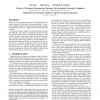Free Online Productivity Tools
i2Speak
i2Symbol
i2OCR
iTex2Img
iWeb2Print
iWeb2Shot
i2Type
iPdf2Split
iPdf2Merge
i2Bopomofo
i2Arabic
i2Style
i2Image
i2PDF
iLatex2Rtf
Sci2ools
129
click to vote
PVLDB
2010
2010
Mining Significant Semantic Locations From GPS Data
With the increasing deployment and use of GPS-enabled devices, massive amounts of GPS data are becoming available. We propose a general framework for the mining of semantically meaningful, significant locations, e.g., shopping malls and restaurants, from such data. We present techniques capable of extracting semantic locations from GPS data. We capture the relationships between locations and between locations and users with a graph. Significance is then assigned to locations using random walks over the graph that propagates significance among the locations. In doing so, mutual reinforcement between location significance and user authority is exploited for determining significance, as are aspects such as the number of visits to a location, the durations of the visits, and the distances users travel to reach locations. Studies using up to 100 million GPS records from a confined spatio-temporal region demonstrate that the proposal is effective and is capable of outperforming baseline met...
GPS Data | Locations | Massive Amounts | PVLDB 2010 |
Related Content
| Added | 20 May 2011 |
| Updated | 20 May 2011 |
| Type | Journal |
| Year | 2010 |
| Where | PVLDB |
| Authors | Xin Cao, Gao Cong, Christian S. Jensen |
Comments (0)

